03/04/2013
Meeting with Baghdad PC Chairman Kamil Zaidi in the Newspaper "Our Baghdad"
The newspaper "Our Baghdad" published on frontpage the report about the meeting of USAID's Senior Consultant in Local Government Mr Murat Daoudov with the Chairman of Baghdad Provincial Coun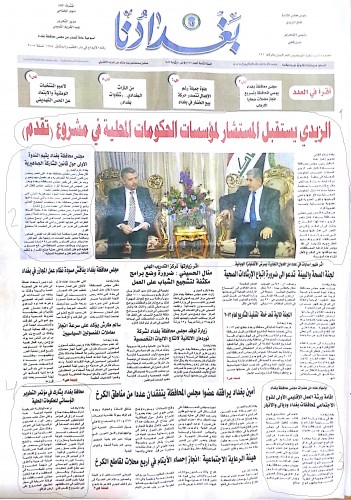 cil Mr Kamil Zaidi (Edition of 10 Feb 2013).
cil Mr Kamil Zaidi (Edition of 10 Feb 2013).
تقرير في صحيفة بغدادنا عن لقاء بين السيد مراد داودوف مستشار اقدم في الحكومات المحلية للوكالة الامريكية للتنمية الدولية و السيد كامل الزيدي رئيس مجلس محافظة بغداد
(10-02-2013)
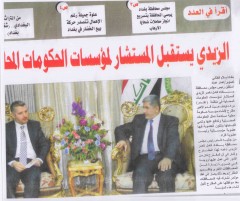
20:26 | Permalink | Comments (0)
06/12/2012
Lisbon Forum discussed the Arab Season
Lisbon Forum 2012: "The Arab Season: from change to challenges"
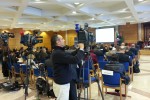
The 2012 Lisbon Forum took place on 3-4 December 2012 in Lisbon/Portugal. The event was organised by the North-South Centre of the Council of Europe in partnership with the UN Alliance of Civilizations. It took place in the framework of the Programme “Strengthening democratic reform in the southern Neighbourhood”, funded by the European Union and implemented by the Council of Europe.
The theme for this year’s Forum was "The Arab Season: from change to challenges". It was a follow-up to the previous year’s edition and focused again on the developments in the Arab countries of Northern Africa and the Middle East in order to take stock of the progress made - and obstacles met - on the path towards democracy. Particular attention was paid to new political élites, youth and women activists and to the process of democratic reforms.
The event report is to be found here while the full programme is available here .
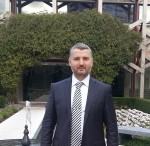
A flashback...
As member of the North-South Centre Think Tank of the Council of Europe, I had the chance to bring my modest contribution to the preparations of the Forum. Namely, I had worked on the initial elaboration of the concept of this year's Forum and actually had proposed its title "from change to challenges" (by the way, a title applauded by many speakers).
Besides, I had proposed to have also discussions on the local governments in the Arab world. This proposal was adopted by the North South Centre which finally entrusted me with moderating the Workshop 3 "Addressing the challenges of democratisation: political reforms, including the reform of local self‐government". This is my third participation in the Lisbon Forum. In 2010 I had moderated the session entitled “The prevention of radicalisation and religious extremism”, while in 2011 I was honoured with moderating the session on Tunisia, the pioneer of the Arab revolutions. This last experience had inspired me to write the article "Can Turkey inspire Tunisia", which was published in several newspapers in the Arab world.
* * *
Here below is the panel setting of this year:
The workshop conclusions have been presented at the closing session of the Forum by Younes Sekkouri:
The session started with a brief introduction of the topic by the moderator stressing the importance of local self-government reforms as a major challenge of democratisation in the Arab world. Then different speakers addressed the issue from various perspectives:
- The Moroccan experience introduced by Mr Sekkouri Younes, Parliamentarian, pointed out the necessity of a complementarity between the central and local governments and the need of identification among the population with the elected bodies. Mechanisms of a better participation are to be found not only in the voting process, but also in involving citizens to follow up the management of their local affairs.
- Mr Tarak Mahdaoui, Member of the Independent High Body for Elections in Tunisia, outlined the situation under the prism of serious regional disparities, which were source of the socio-economic claims in early 2008 and of the source of the Tunisian Revolution in 2011. He pleaded for better regional development policy in the new Tunisia and for political responses to the problem by strengthening the decentralisation and assuring better representativeness of local bodies.
- Mr Christophe Rouillon, Member of the Committee of the Regions witnessed of the French experience in local government and pleaded for more solid European approach in development cooperation. He stressed that in the difficult times of crisis a tendency is to cut from the budgets related to external actions of the Union, which is a historical mistake given the importance of the developments in the neighbourhood to Europe itself.
The workshop panellists and participants formulated following recommendations:
- The institutionalisation of local government in the Arab countries should be properly addressed in the constitutions in order to stress its importance.
- The State's overall architecture should better separate between sovereign/national and local powers to enable complementarity and clarity between different levels.
- The relationship between central and local powers needs to shift from close tutelage to empowerment; the control of opportunity must transform into a control of legality a posteriori.
- Local governments should to be consulted systematically by central powers regarding all national policies that affect local competencies.
- Local governments should be provided sufficient financial autonomy, through increase of local revenues, increase of tax revenue shares and appropriate mechanisms of transfers for a more cohesive development of territories. Thus, regional disparities should be tackled through balanced regional and local economic development policies.
- Local governments should be able to form their associations, for better representation of their interests and better coordination.
- The popular participation in the local life should not be restricted to the election processes; various mechanisms of participatory democracy should be promoted.
- Equality and gender balance should be assured at local level and social groups with specific needs as well as minorities should be taken into consideration.
- The principle of subsidiarity should be promoted and respected; central governments should transfer competencies with sufficient resources to local governments. Thus, countries should seek for an appropriate equilibrium between decentralization and deconcentration.
- The status of a local elected official should be given a clear legal and financial framework in order to allow the good exercise of local responsibilities.
22:48 Posted in Activité | Permalink | Comments (0) | Tags: the lisbon forum, murat daoudov
30/07/2012
Murat Daoudov at TRT Arabic talks about public and local diplomacy
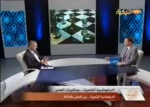 Marmara Belediyeler Birliği Uluslararası İşbirliği Direktörü Murat Daoudov TRT Arapça kanalında Elvan-ı Seb'a programında Dr. Nizar Herbavi'nin konuğu oldu. Programda halk diplomasisi ve yerel diplomasi konuşuldu.
Marmara Belediyeler Birliği Uluslararası İşbirliği Direktörü Murat Daoudov TRT Arapça kanalında Elvan-ı Seb'a programında Dr. Nizar Herbavi'nin konuğu oldu. Programda halk diplomasisi ve yerel diplomasi konuşuldu.
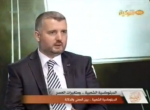
Murat Daoudov, Director of International Cooperation of the Union of Municipalities of Marmara (UMM) participated in the TV talk show al-Alwan as-Sab'a of Dr Nizar Hirbawi an the TRT Arabic channel. The topic was public diplomacy and local diplomacy.
مراد داودوف مدير لتعاون دولي في اتحاد بلديات مرمرة من تركيا ضيف في برنامج الألوان السبعة لالدوكتور نزار الحرباوي
موضوع البرنامج - الديبلوماسية الشعيبة و المحلية
30-07-2012
21:57 | Permalink | Comments (0)
31/05/2012
TRT Arabic - Al-Alwan Al-Sab'a / الألوان السبعة - التركيا
Marmara Belediyeler Birliği Uluslararası İşbirliği Direktörü Murat Daoudov ve Çin Uluslararası Dostluk Şehirleri Birliği Genel Sekreter Yardımcısı Ayşe Jia Ling TRT Arapça kanalında Elvan-ı Seb'a programında Dr. Nizar Herbavi'nin konuğu oldu.
Murat Daoudov, director of international cooperation of the Union of Municipalities of Marmara (UMM), and Ayisha Jia Ling, deputy secretary general of the Chinese International Associaton of Friendship Cities (CIFCA), participated in the TV talk show of Dr Nizar Hirbawi in the TRT Arabic channel.
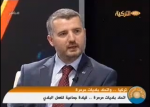
مراد داودوف مدير لتعاون دولي في اتحاد بلديات مرمرة من تركيا و عائشة
جيالينغ نائبة امين عام في الاتحاد الصيني الدولي لتوأمة المدن ضيفان في برنامج الألوان السبعة
لالدوكتور نزار الحرباوي
31-05-2012
http://www.youtube.com/watch?v=PKy3I6rs5d0
http://www.youtube.com/watch?v=NfTcgnDZiLI
21:47 | Permalink | Comments (0)
03/03/2012
برنامج السوق / قناة اقرأ IQRA TV
"الخدمات و دورها فى تيسير التجارة" في برنامج "السوق"
In the TV programme As-Souk (Market) Murat Daoudov spoke with Sheikh Saleh Kamal from Saudi Arabia and with Adem Varıcı from Istanbul on the role of local governments in Turkey in developing local economy and providing services to citizen.
Programme broadcasted on 27.02.2012 on Iqra TV Arabic.

لأن لقطاع الخدمات دور حيوي في عملية التنمية بإسهامه في الإنتاج والاستخدام وموازين المدفوعات لسائر الدول فإن حلقة هذا الأسبوع من برنامج "السوق" في جزئه الثالث والتي تأتيكم من تركيا وتبث مساء الإثنين الموافق للسابع والعشرين من فبراير تسلط الضوء على موضوع "الخدمات و دورها فى تيسير التجارة" حيث يستمع فيها سعادة الشيخ صالح كامل إلى ضيفيه ويدير الإعلامي بندر عرب الحوار حول أهمية الخدمات في الاقتصادات الوطنية والتي تنبع من صلتها المشتركة مع القطاعات الاقتصادية الأخرى ومن أثرها على المنافسة الدولية وتقسيم العمل وكذلك من ارتباطها المتزايد بالتقدم التكنولوجى.
|
http://www.iqraa.com/ar/NewsDetails.aspx?newsID=50A105A10...
21:43 | Permalink | Comments (0)
02/03/2012
International Arabic Competitions on "Kudüs TV"
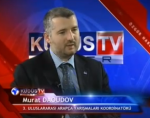 International coordinator of the 3rd Internatonal Arabic Competitions Murat Daoudov spoke about the contest in the Turkish satellite channel Kudüs TV.
International coordinator of the 3rd Internatonal Arabic Competitions Murat Daoudov spoke about the contest in the Turkish satellite channel Kudüs TV.
3. Uluslararası Arapça Yarışmaları anlatmak üzere Uluslararası Koordinatörü Murat Daoudov Kudüs TV'de Arzu Erdoğral'ın konuğu oldu.
المنسق الدولي للمسابقة الدولية الثالثة في اللغة العربية مراد داودوف شارك في البرنامج عن هذا المشروع على " القدس تي في" الفضائية التركية
02.03.2012
22:20 | Permalink | Comments (0)
24/11/2011
Can Turkey inspire Tunisia?
|

  
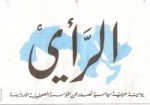  Can Turkey inspire Tunisia?
25 November 2011
Translation in French, Arabic, Urdu, Indonesian and Hebrew available at CGNews, while Turkish translation can be read here: http://www.timeturk.com/tr/2011/11/25/turkiye-tunus-a-ilham-verebilir-mi.html
The article has been published in the Saudi daily "The Arab News", the Emirati daily "The Khaleej Times", the Lebanese daily "The Daily Star", the Indonesian daily "The Bali Times", the Jordanian daily "Al-Rai" (in Arabic), the Bahraini daily "Al-Wasat" (in Arabic), as well as at the Al-Arabiya English TV web site.
|
23:22 | Permalink | Comments (0)








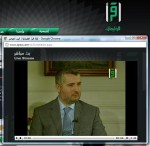 21:00 (مكة) – 18:00 (GMT)
21:00 (مكة) – 18:00 (GMT)

